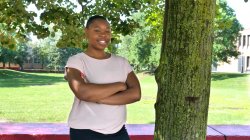365 Days of Pride
LGBTQ Pride, like Black Lives Matter, isn’t just a moment or a month
Posted in: University

With the world’s attention turned to racial injustice after George Floyd’s death at the hands of Minneapolis police and the campus still mostly closed because of COVID-19, Montclair State quietly celebrated LGBTQ Pride Month online this June and will extend the celebration through the year.
In addition to sharing virtual events with the campus community, Ebony Jackson ’14, ’16 MA, assistant director of the Office for Social Justice and Diversity, marked the month by focusing on the intersections of race, gender and sexuality.
“Looking at Pride, we’re talking about queer and trans people who may be people of color and taking it further – who may be disabled, who may be homeless, who may be poor, who may not have a college education or any of those other identities or identity factors, that face oppression or marginalization or discrimination.”
At the Office for Social Justice and Diversity, Jackson and others work to provide leadership on the issues of inclusion and diversity, helping others within the campus community and without through workshops and training, shaping the leaders of tomorrow through partnerships with student organizations, and providing a space for community members to be authentic, challenge intolerance and foster acceptance.
The Office encompasses various centers and takes on the challenges facing people of color, the LGBTQ community, women, people with disabilities, those facing discrimination based on their faith and more.
Jackson says she shapes her approach from an intersectional lens best explained with this quote from Audre Lorde: “There is no such thing as a single-issue struggle because we do not live single-issue lives.” Jackson explains that the term “intersectionality” was coined in the 1980s by Kimberle Crenshaw, who found that the anti-racist and feminist movements failed to address the issues that women of color were experiencing – both on race and gender. The term has grown to encompass all those who experience multiple sources of oppression: their race, class, gender identity, sexual orientation, religion, and other identity markers.
As Black Lives Matters protesters take to the streets, Jackson points to the fact that transgender women of color played pivotal roles in the Stonewall riots and the early LGBTQ movement.
“It was just a couple of years ago that people were learning about Sylvia Rivera and Marsha P. Johnson’s involvement with the Stonewall riots and the LGBTQ movement. It’s just another example of how we have to recognize and act on intersectionality.”
With COVID-19 raging, Jackson has been utilizing @osjdmontclair on Instagram to reach students. She says that today’s students amaze and inspire her. Even though Jackson is just a few years older, she finds this generation much bolder – especially in their use of social media as an activist tool: “They will call you out and say, ‘I’m going to hold you accountable.’”
“When I was a student, I would never comment on Instagram. I would screenshot things and I would send an email if I had a grievance. Now students are just flying through the comments. But the thing is, because it’s so public it seems to be the most surefire way to get responses and get results.”
Jackson is hopeful that the University will be able to celebrate Pride with in-person events this fall. She points out that October 11 is National Coming Out Day, October is LGBT History Month and November includes Transgender Awareness Week.
Meanwhile, at this moment in time, Jackson sees Pride and #BLM stretching the idea that marginalized histories be contained within designated months, weeks or days: “The veil has been lifted and everybody sees what’s going on now.”
Story by Staff Writer Mary Barr Mann
